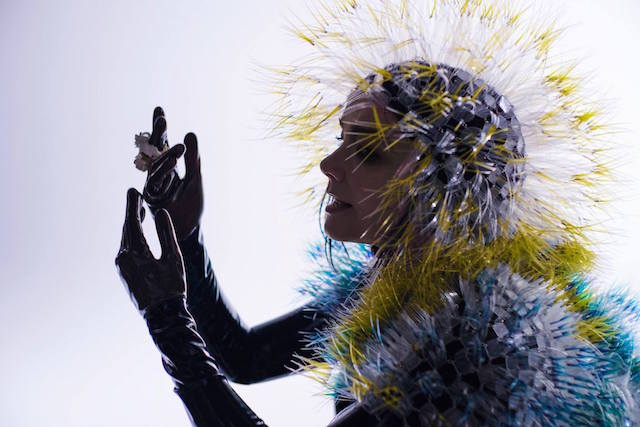Twenty five years into her career as a solo artist and Björk
is still impossible to ignore. There are
a lot of factors as to why anytime Björk announces a new project it instantly
becomes highly anticipated. Her trademark intrepid fashion sense and amazing
artistry are aspects on that list but ultimately it comes down to – her
timeless music.
Björk has always been an artist that has worn her heart on
her sleeve and this openness with her emotions has never been more evident than
on her ninth studio album Vulnicura. Take the album cover for example; her
wretched and wounded heart is on display for the world. This is a heartbreak
album – and it takes some guts listening to.
“As much as I wanted to write a disco song,I just couldn’t”
the Icelandic innovator explains during an interview with 6 Music. Vulnicura feels and sounds like a therapeutic
response to Björk’s breakup with long time partner Matthew Barney. Although, on
the closing track ‘Quicksand’ there’s a sense of closure when she sings “when
I'm broken I am whole, and when I'm whole I'm broken”. It took a lot of strength and equally,
vulnerability to get to that stage.

Vulnicura’s centrepiece, the ten minute long ‘Black Lake’ is
a sincere expression of the pain her break up. London-based producer Arca,
who co-produced the whole album captures the sheer sorrow of the singer with an
unsullied string arrangement that later explodes into a techno throb. The two
sounds are too diverse to merge with each other but somehow work synchronously with
Björk’s undeniable upset as she declares that her “soul has been torn apart”
and asks the dreaded question “Did I
love you too much?”.
Throughout the album there is a reoccurring theme of family
and family values between parents and child. On the song ‘Family’ between Arca’s
production and Björk’s raw emotion, it can become quite overwhelming. The devastating
stagger of the beat behind her cries for her child erupts to an interlude of a paroxysmal
play of cellos. Before departing into a euphonious plead with Björk pleading “god
save our daughter/god save our daughter”.
Björk’s 2001 album Vespertine mirrors Vulnicura in a parallel
manner. Vespertine marks the start of her relationship with Matthew Barney and
covers the intimate, nurturing love element. While Vulnicura
is just as personal, it is more universal and frank. On History of Touches, the
album’s most intimate song, the blooming passion that she once sang about on
Vespertine’s Cocoon has been reduced to “Every single fuck we had together”.

Post break up albums have become common within music today,
so it is understandable why anyone might be a little sceptical upon listening
to Vulnicura, her first self-penned ‘break up album’. But the album offers much more substance than the
likes of Taylor Swift singing “We, are never ever ever, getting back together”.
Like all her previous work Björk manages to convey her feelings through the
power of her lyrical content.
The opening lines in the theatrical Mouth Mantra, unsettlingly
communicate the struggle Björk faced whilst coming to terms with the breakdown
of a decade long relationship. “My throat was stuck/my mouth was sewn up/Banned
from making noise/ I was not heard”. Before
roaring she has ‘followed a path/ that took sacrifices’ and it seems those
sacrifices have paid off.
Vulnicura appears to be two words joined up to make one – ‘vulni’
meaning vulnerable and ‘cura’ as in curative. Which makes sense because after experiencing
Vulnicura it is undeniable that Björk is a strong woman, but just as human as
we all are.
Recommend Tracks: Lionsong, Black Lake, Notget, History of Touches
Rating: 8/10


No comments:
Post a Comment